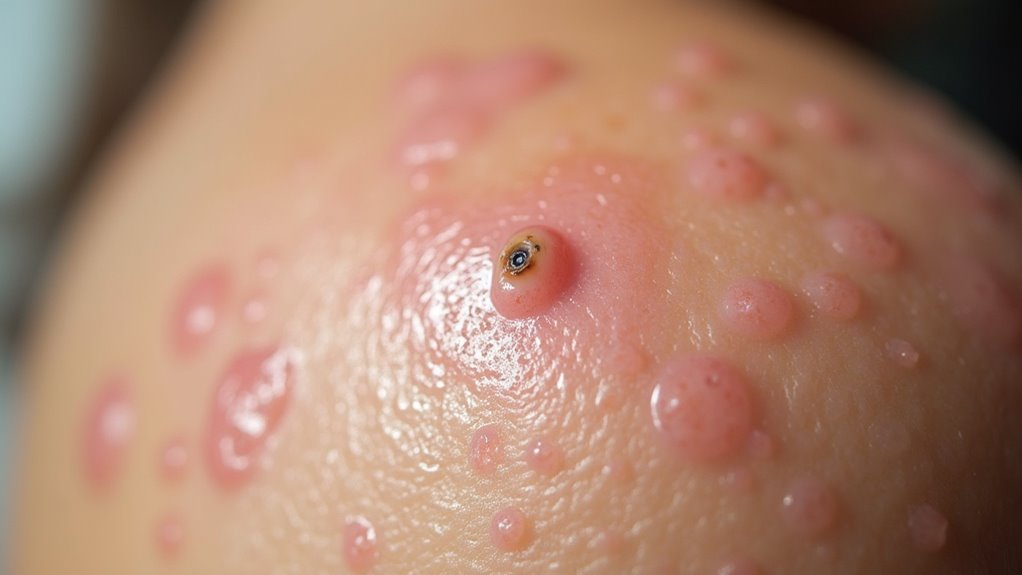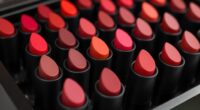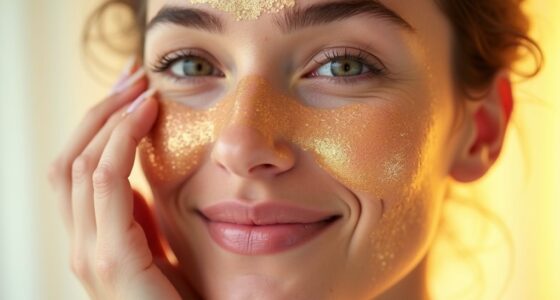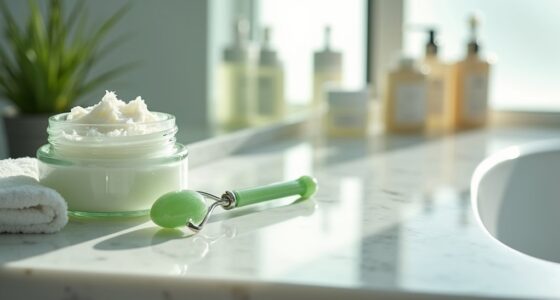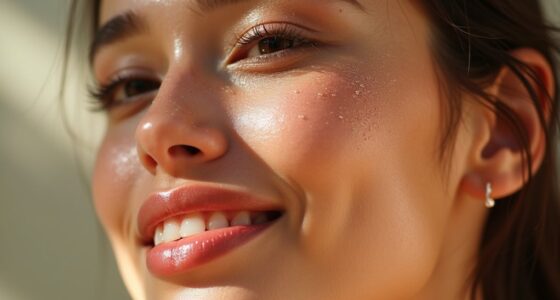Many beliefs about acne are myths. For example, it’s not just a teenage problem, and greasy foods don’t directly cause breakouts—though high-glycemic foods and dairy might. Acne won’t go away without treatment, and poor hygiene isn’t the main cause. Sun exposure may temporarily appear helpful but actually damages your skin. Popping pimples worsens scars, and certain makeup products can clog pores. If you want to clear up misconceptions and learn effective tips, keep exploring this topic.
Key Takeaways
- Acne is influenced by hormones, genetics, and lifestyle factors, not just poor hygiene or greasy foods.
- Sun exposure may temporarily reduce inflammation but damages skin long-term and does not treat acne effectively.
- Early treatment prevents scars and hyperpigmentation; acne usually won’t go away on its own without proper care.
- Popping pimples worsens inflammation, increases scarring, and spreads bacteria; leave them to heal naturally.
- Using non-comedogenic skincare and avoiding harsh products helps prevent breakouts and supports skin health.
Acne Is Just a Teenager’s Problem

Many people believe that acne only affects teenagers, but that’s simply not true. Adult acne is common and can persist or even start later in life. Teenage hormones often trigger breakouts, but hormonal fluctuations in adults—due to stress, medications, or hormonal imbalances—also cause acne. It is crucial to understand that skincare routines matter at any age. Proper cleansing, avoiding harsh products, and using non-comedogenic moisturizers help manage breakouts. Many adults mistakenly think acne is just a teenage issue, ignoring the impact it has on confidence and skin health. Recognizing that acne isn’t limited to teens allows you to take proactive steps, like adjusting your skincare routine or consulting a dermatologist, regardless of your age. Acne can affect anyone; age doesn’t define your skin’s health. Additionally, understanding hormonal fluctuations can help individuals navigate emotional challenges related to skin confidence and self-image, especially considering how biological factors influence skin health across different ages.
Eating Greasy Foods Causes Acne

While it’s a common belief that eating greasy foods directly causes acne, the relationship isn’t that straightforward. Your diet impact on acne isn’t solely about greasy foods but also involves overall nutrition and individual response. Some people notice breakouts after consuming fried or oily foods, but for most, these aren’t the primary triggers. Instead, high-glycemic foods and dairy often have a stronger link to acne. Greasy foods can contribute to clogged pores if they lead to excess oil production, but they don’t automatically cause acne. It’s important to focus on a balanced diet and monitor how your skin reacts. Additionally, the overall cost of electric bikes can influence your choices if considering eco-friendly transportation options. Remember, eating greasy foods occasionally isn’t likely to worsen your acne unless combined with other factors. Maintaining a healthy skin routine and staying hydrated can also help manage breakouts effectively. Incorporating biodiversity-friendly dietary choices, such as reducing processed foods, may support better skin health over time.
Acne Will Go Away on Its Own
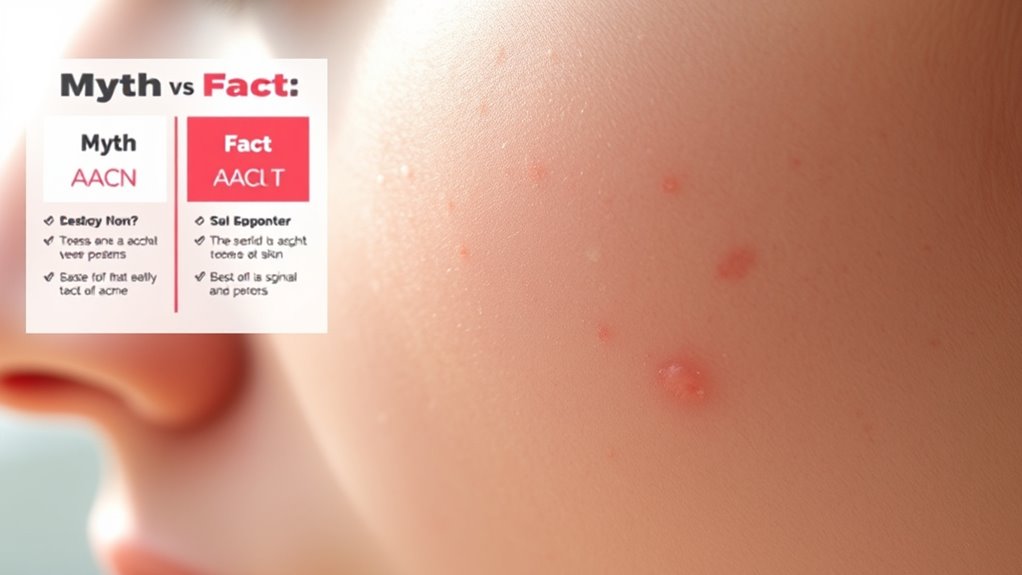
Many believe acne will clear up without effort, but persistence factors like hormones and bacteria can keep it around longer. Time alone often doesn’t resolve breakouts, and waiting too long might lead to scars or worse. Starting treatment early helps prevent these issues and speeds up your path to clearer skin. Additionally, understanding the role of exfoliation benefits in skincare highlights the importance of proactive measures in both skincare and financial planning. Just as electric dirt bikes can produce significant horsepower and speed, early intervention in skincare can lead to faster, more effective results.
Acne Persistence Factors
Have you ever wondered if acne will simply clear up on its own? The truth is, certain factors can make acne persist longer. Pore clogging from excess oil, dead skin cells, and dirt creates an environment where acne-causing bacteria thrive. If you don’t address these, the bacterial infection worsens, leading to more inflammation and stubborn pimples. Hormonal changes, stress, and improper skincare can also contribute to prolonged breakouts. You might expect acne to fade naturally, but without treatment, it often lingers or worsens. Persistent acne indicates that your skin needs extra help to clear out impurities and control bacterial growth. Recognizing these factors is key to understanding why some breakouts stick around longer than others, and why healthy eating habits and targeted care can make a difference. Additionally, AI-driven analysis of skin conditions is increasingly used to develop personalized skincare solutions that effectively address persistent acne. Moreover, skin environment plays a crucial role in how long acne lasts and how well it responds to treatment. Implementing proper skincare routines can also prevent the worsening of persistent acne and promote quicker healing.
Time Doesn’t Heal All
Some people believe that acne will clear up on its own over time, but that’s often a misconception. Waiting for acne to disappear without a proper skincare routine can lead to worsening breakouts or scarring. Your skin responds best when you use targeted skincare ingredients like salicylic acid or benzoyl peroxide to treat blemishes effectively. Relying solely on time can delay treatments that work, allowing inflammation and bacteria to persist. Incorporating educational toys that promote skin health awareness can also empower young individuals to adopt better skincare habits early on. Additionally, understanding the influence of AI on music creation can inspire innovative ways to approach skincare education through multimedia. Remember, patience alone won’t resolve acne; proactive care with the right ingredients makes a significant difference. Ignoring active treatments can prolong your skin’s healing process and cause unnecessary frustration, especially since water-based remedies such as hydrotherapy can support skin recovery and reduce inflammation. Recognizing digital literacy programs that teach proper skincare routines can further enhance effective treatment adherence.
Early Treatment Benefits
While it might seem tempting to wait for acne to clear up on its own, early treatment offers clear advantages. Beneficial early intervention can prevent acne from worsening and reduce the risk of scars. Recognizing the treatment importance helps you maintain clearer skin in the long run. Here are four key benefits:
- Stops blemishes from becoming severe or persistent
- Minimizes the chance of scarring and hyperpigmentation
- Shortens the duration of breakouts
- Boosts confidence by managing skin issues early
Taking action early ensures you don’t leave acne to resolve on its own, which can sometimes lead to more complicated problems. The beneficial early approach keeps your skin healthier and reduces the emotional toll of prolonged breakouts. Symptoms of acne can often be mistaken for other skin conditions, so early diagnosis and treatment are crucial for effective management.
Only Poor Hygiene Causes Acne
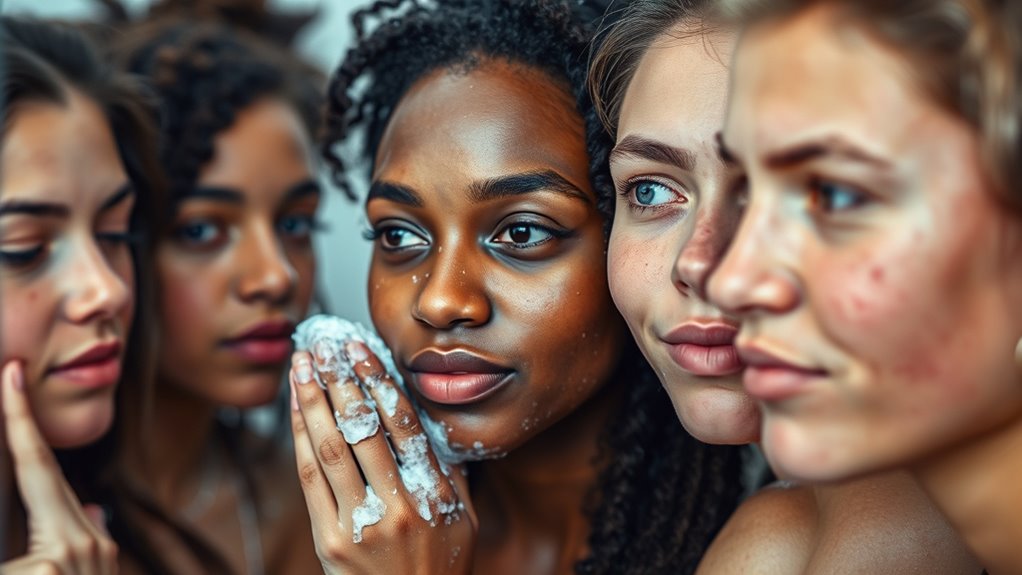
Many people believe that poor hygiene is the main cause of acne, but that’s not the full story. Hormonal changes and genetics also play significant roles in how your skin develops breakouts. Understanding these factors helps you see that acne isn’t just about cleanliness.
Hormonal Fluctuations Impact Acne
Hormonal fluctuations play a significant role in the development of acne, contrary to the myth that poor hygiene is the primary cause. Your hormones influence oil production, leading to clogged pores and breakouts. During hormonal therapy or menstrual cycles, hormone levels spike and dip, triggering acne flare-ups. To understand this better, consider these points:
- Increased androgens boost oil glands’ activity, causing excess oil.
- Menstrual cycles often cause hormonal shifts, worsening acne symptoms.
- Hormonal therapy can regulate or disrupt hormone levels, affecting your skin.
- Stress also influences hormones, potentially aggravating acne.
- The automation of skincare routines through advanced technology can help manage hormonal effects on your skin.
- Recognizing the hormonal influence on acne helps in choosing appropriate treatments and skincare strategies.
Recognizing these factors helps you see that hormones, not hygiene, primarily impact acne severity and frequency.
Genetics Play a Role
Although hormonal fluctuations profoundly influence acne, your genetic makeup also plays a key role in determining whether you’re prone to breakouts. Your genetic predisposition affects how your skin responds to oils and bacteria, making some people more susceptible than others. Inherited traits, such as the size of your pores or how your skin produces oil, can increase the likelihood of acne. If acne runs in your family, you might be more prone to breakouts regardless of hygiene habits. It’s important to understand that genetics set the foundation for your skin’s behavior, but lifestyle factors still matter. While you can’t change your genes, knowing your inherited traits can help you customize your skincare routine for better results.
Sun Exposure Clears Up Acne
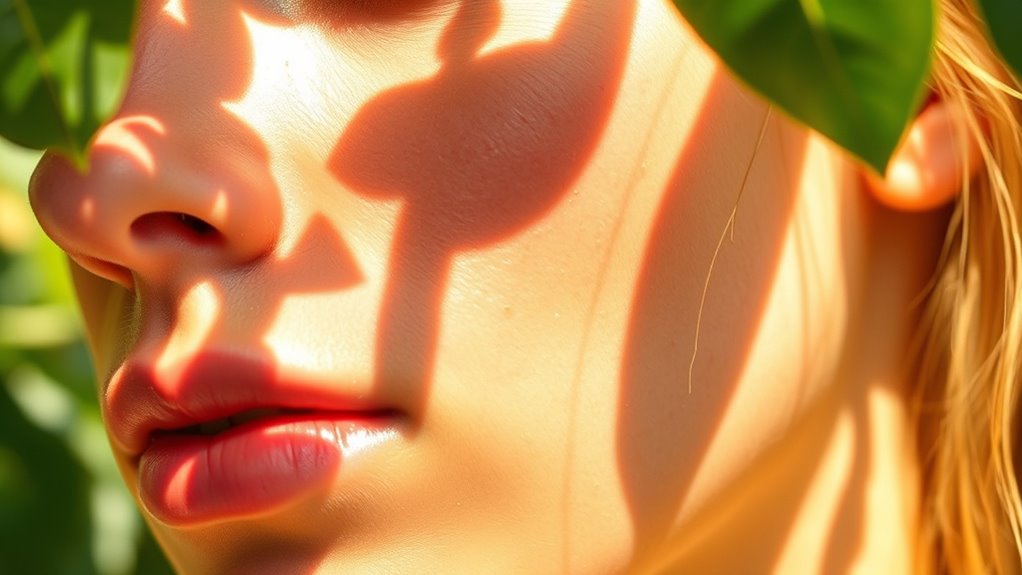
While some believe that sun exposure can clear up acne, this idea is misleading. Although UV effects might temporarily reduce inflammation, it’s not a healthy or effective solution. Relying on sun exposure can lead to skin damage and increase your risk of skin cancer. To understand this better, consider:
- Overexposure damages skin cells and accelerates aging.
- Sunburns cause long-term scars and hyperpigmentation.
- Sun protection is essential to prevent harmful UV effects.
- Any temporary acne clearing is just skin drying out, not healing.
Instead of risking sun damage, focus on proven treatments. Protect your skin with sun protection and avoid using the sun as an acne cure. Remember, clear skin requires consistent care, not risky UV exposure.
Popping Pimples Will Help Them Heal Faster
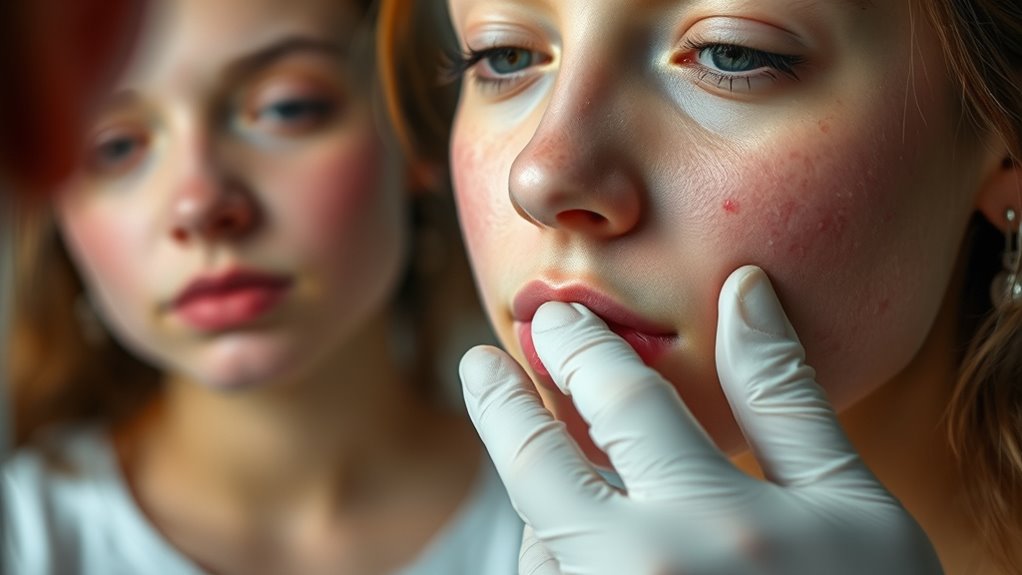
Many people believe that popping pimples helps them heal faster, but in reality, this healing myth can worsen your skin. Popping myths often lead to infections, scarring, and increased inflammation. Instead of accelerating healing, squeezing a pimple forces bacteria deeper, causing more breakouts. Here’s a quick comparison:
| Action | Effect on Healing | Risk |
|---|---|---|
| Popping pimples | Delays healing, spreads bacteria | Scarring, infection |
| Leaving pimples alone | Supports natural healing | No added risk |
| Proper treatment | Promotes quick, safe healing | Minimal risk |
Understanding these healing myths clarifies that resisting the urge to pop helps maintain clearer, healthier skin.
Makeup and Skincare Products Make Acne Worse
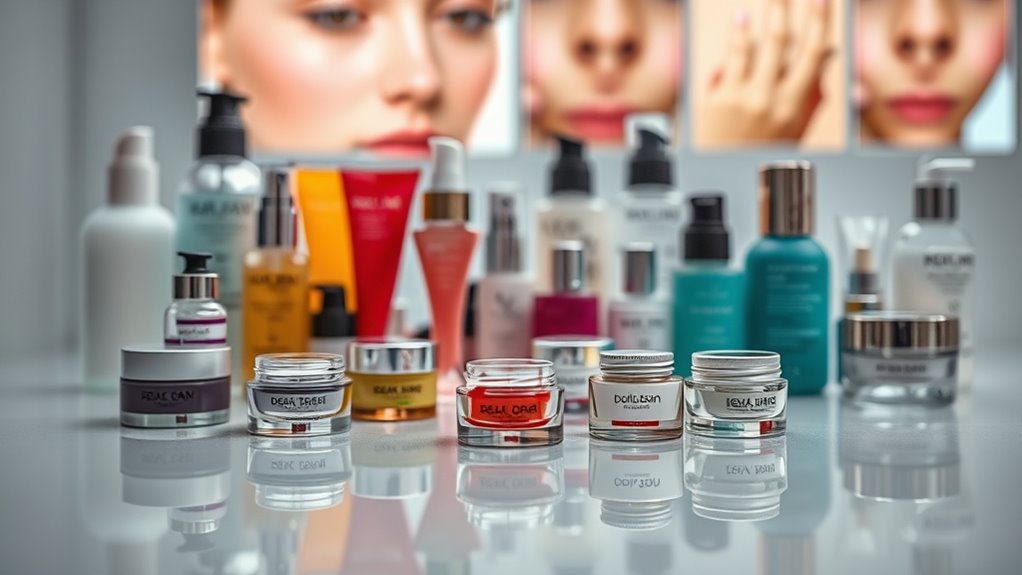
Certain makeup and skincare products can clog pores and trigger breakouts, making acne worse instead of better. This often happens when cosmetic ingredients are comedogenic or not suitable for your skin type. To keep your skincare routines effective and acne-free, avoid products with these common culprits:
Avoid comedogenic ingredients and heavy products that can clog pores and worsen acne.
- Heavy oils or greasy textures that trap dirt and bacteria.
- Comedogenic ingredients like cocoa butter and certain silicones.
- Fragrances and alcohols that irritate sensitive skin.
- Thick foundations or powders that clog pores and block skin’s breathability.
Choosing non-comedogenic products and reading labels carefully can prevent worsening your acne. Remember, your skincare routine should support your skin’s health, not hinder it. Being mindful of cosmetic ingredients helps keep breakouts at bay.
Stress Is the Main Cause of Acne
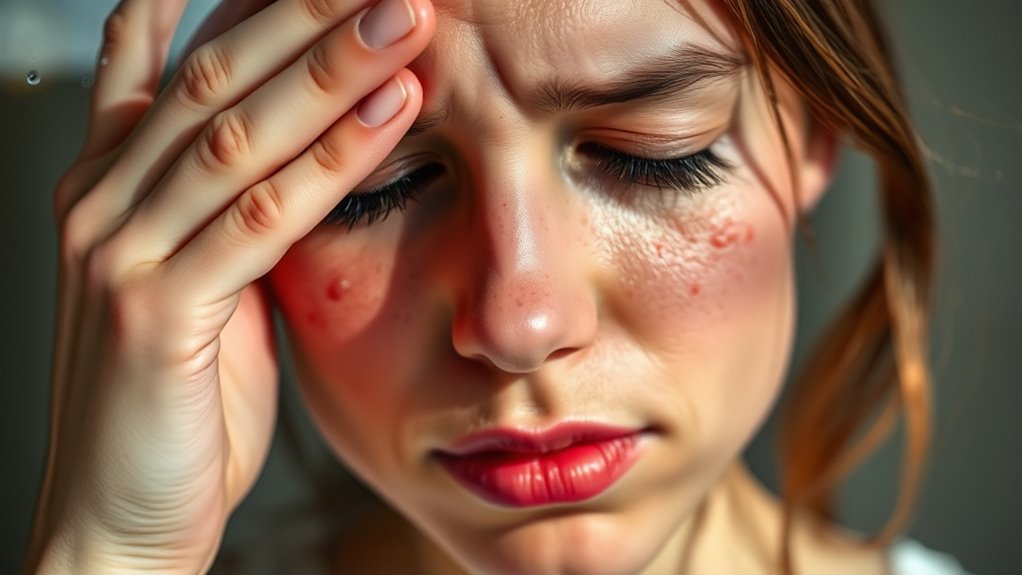
Stress considerably impacts your skin by triggering hormonal changes that increase oil production and inflammation, leading to breakouts. Stress triggers activate your body’s hormonal influence, especially cortisol, which can stimulate your sebaceous glands to produce excess oil. This excess oil clogs pores and creates an ideal environment for bacteria to thrive, resulting in acne. While stress alone isn’t the sole cause of acne, it worsens existing skin issues and makes your skin more prone to breakouts. Managing stress through relaxation techniques and healthy habits can help reduce these hormonal influences. Remember, your skin’s response to stress varies, but controlling stress levels can play a significant role in maintaining clearer skin. Don’t underestimate the power of stress management in your skincare routine.
Acne Scars Are Permanent and Unchangeable
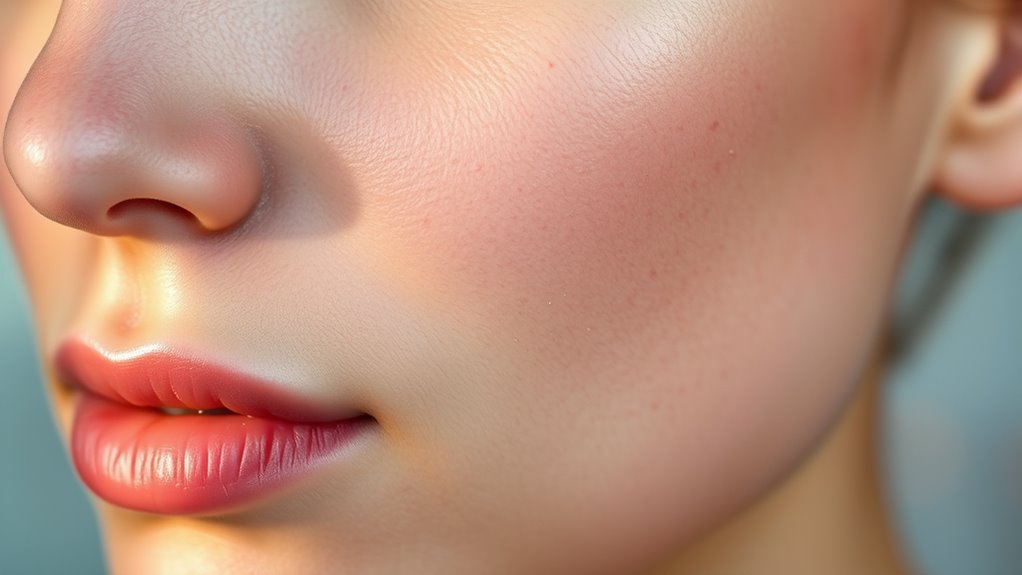
Although acne scars can seem permanent, they are often treatable with modern skincare techniques and procedures. Advances in scar treatment and skin remodeling mean you don’t have to accept scars as final. Here are four ways you can address acne scars:
Acne scars are often treatable with modern skincare techniques and procedures.
- Laser therapy: Stimulates collagen production to smooth skin.
- Microneedling: Promotes skin remodeling and reduces scar depth.
- Chemical peels: Remove damaged skin layers for a clearer complexion.
- Subcision: Breaks fibrous bands causing indentations.
These treatments target your skin’s healing process, encouraging new, healthy tissue growth. With consistent care, you can markedly improve your skin’s appearance, making scars less noticeable and boosting your confidence. Don’t believe the myth—your skin can change.
Frequently Asked Questions
Can Certain Medications Worsen or Improve Acne Symptoms?
Certain medications can definitely influence your acne, either worsening or improving your symptoms. You should be aware of potential medication side effects, as some acne medication or other drugs like corticosteroids or birth control pills might trigger breakouts. Always consult your healthcare provider before starting new medication. They can guide you on how your medication might impact your skin and recommend appropriate treatments to manage or prevent acne flare-ups effectively.
Are Hormonal Changes Solely Responsible for Adult Acne?
Is hormonal fluctuation the sole villain behind adult acne? Not entirely. While hormonal changes can trigger flare-ups, they’re just one piece of the puzzle. Adult skin changes, stress, diet, and skincare routines also play significant roles. Think of your skin as a symphony; hormonal shifts may cause a discord, but other factors contribute too. So, balance hormones, but don’t forget to care for your overall skin health.
Do Natural Remedies Effectively Treat or Prevent Acne?
You might wonder if natural remedies can effectively treat or prevent acne. Herbal solutions like tea tree oil or aloe vera can help soothe skin, while dietary adjustments—reducing sugar and dairy—may lessen breakouts. However, everyone’s skin reacts differently, so while some see improvements, others may not. It’s best to combine these approaches with proper skincare and consult a dermatologist for personalized advice.
How Does Climate Influence the Severity of Acne?
Think of your skin as a garden, thriving or wilting depending on the weather. Climate impact plays a big role in acne severity, with seasonal variations causing fluctuations. Hot, humid climates can clog pores faster, leading to more breakouts, while cold, dry weather might dry out skin but also cause irritation. Understanding these patterns helps you adjust skincare, so you can keep your skin balanced no matter the season.
Is There a Genetic Predisposition to Developing Acne?
You might wonder if genetics play a role in acne development. Genetic factors and hereditary influence can considerably increase your chances of developing acne, as these traits are passed down from your parents. If your family has a history of acne, you’re more likely to experience it yourself. While environmental factors matter, your genetic makeup can predispose you to more severe or persistent breakouts, making it essential to take into account your family history when managing your skin health.
Conclusion
Remember, don’t believe everything you hear—myths can be misleading. Acne isn’t just a teenage problem, nor does it only come from poor hygiene or greasy foods. Proper skincare, managing stress, and patience are key. Sun exposure or popping pimples won’t solve everything. As the saying goes, “A problem shared is a problem halved”—so stay informed, take care of your skin, and don’t let myths hold you back from clear, healthy skin.
